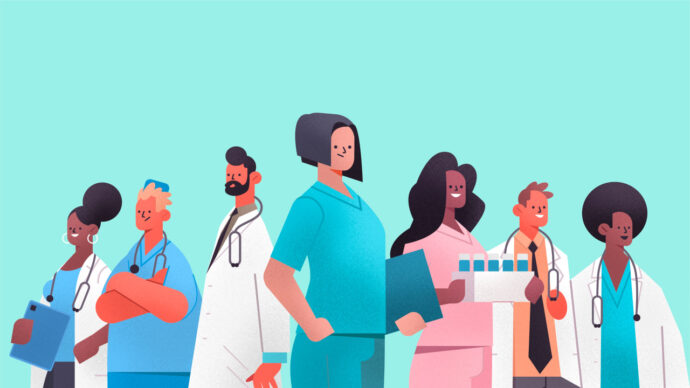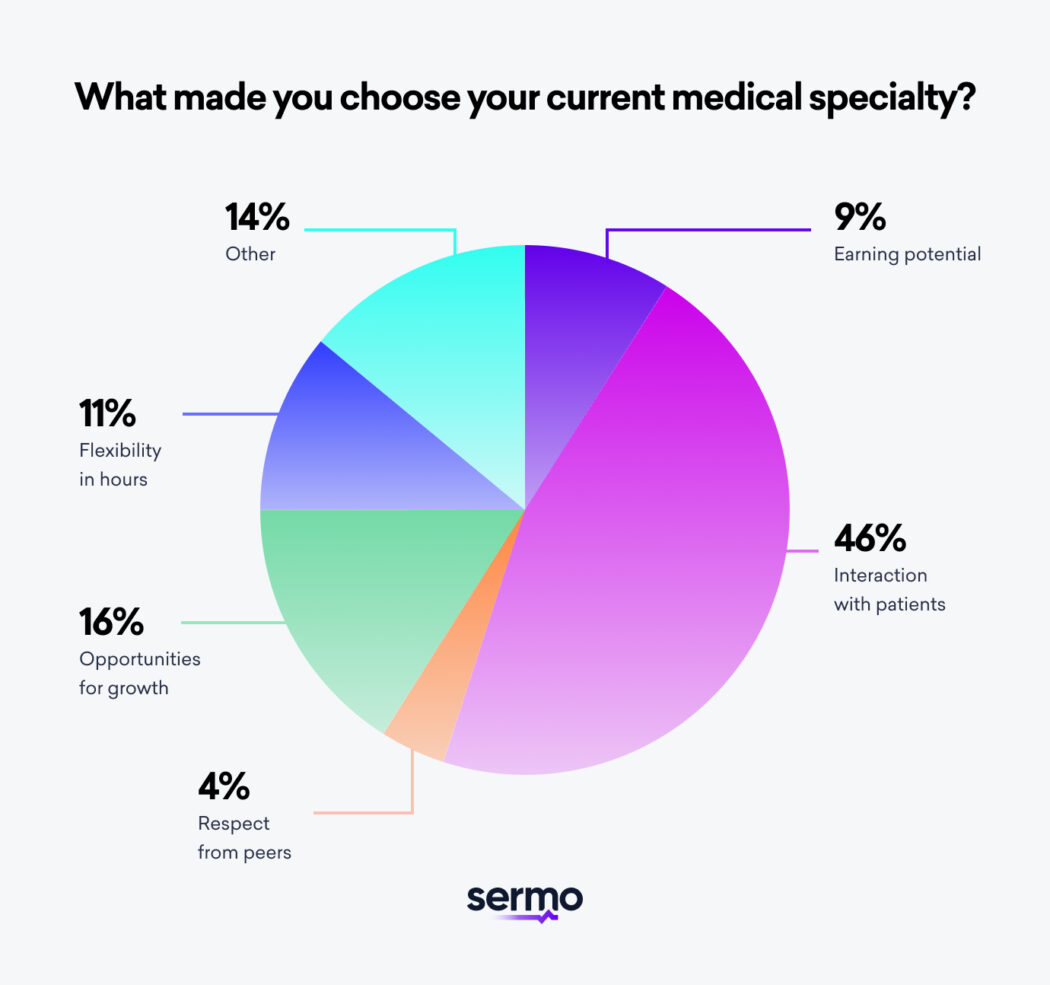Physical Address
Two factors that people often don’t consider with these lists are sampling and self-selection biases. This data represents only a very small sample of the larger doctor population and it may not be entirely representative. And just because 60% of general surgeons in that sample report being happy doesn’t mean that 60% of doctors would be happy becoming general surgeons. These are doctors who have already chosen their specialties. It’s a subtle, but important distinction.
10 best medical specialties for physicians needing a change of pace

Looking to change medical specialties? There are thousands of physicians who consider it, and many who have successfully transitioned to alternative fields. However, whether you’re a specialist looking to change fields, or a general practitioner pursuing a specialization, it can feel daunting.
So, what is the best way to consider different medical specialties? Unsurprisingly, there are no black-and-white answers. Sure, you could simply search for the highest paid specialty, google ‘what is the easiest doctor to become’, look for the role with the fewest hours, or plump for one of the least stressful medical specialties. But ultimately, the happiest doctors are those who weigh up a range of factors to gain the best overall work/life balance and job satisfaction.
In this guide, we’ll outline a list of medical specialties with the best quality of life from various perspectives so you can make the right choice for your goals.

Do physicians change specialties?
In short, yes. But it’s not that easy. It requires a significant sacrifice that may involve repeating residency, building up additional continuing medical education credits, moving, or taking a pay cut while you retrain.
“Yes, I’ve thought about it, but not realistically so. Brief thoughts due to the hours of busy calls and lost compensation for the hours as an OB-GYN. But not seriously due to the length of training.”
OBGYN, US.
However, if you truly want a more satisfying career and are prepared to accept the sacrifices, pursuing a specialty or switching your specialty field can be done.
Many healthcare professionals report a lack of job satisfaction due to current-day pressures in the healthcare system. Many healthcare providers hope the landscape will improve once the sector finally returns to a more stable state in the wake of the COVID-19 pandemic.
Historically, there have always been groups of physicians who craved change. As far back as 2012, Forbes Magazine 1 reported that only 41% of doctors would choose the same specialty again, given the option. In our more recent Sermo survey of 1,500 physicians, 35% said they have considered switching to another specialty.
10 best medical specialties
When looking for a change of direction, you’ll want to weigh all the pros and cons thoroughly. To make a viable shortlist of options and work towards the best lifestyle, medical specialties can be evaluated from several perspectives, such as pay, workload, stress, and the impacts on your family life. To help you, we’ve made this physician’s guide to the ten best medical specialties based on some of the most popular criteria.

Highest Paying Medical Specialty: Surgery
In our survey, only 6% considered salary to be the most important part of their career. And 46% said they felt their current compensation is fair. Just 9% said earning potential was a factor in their specialty choice. However, it may be an important consideration after your retraining costs because most surgeons are highly paid.
Inspira Advantage recently ranked neurosurgeons as the top earners, with the next most lucrative specialties and surgical subspecialties being:
- Orthopedic surgeons
- Plastic surgeons (reconstructive surgery and cosmetic surgery)
- Urology
- Cardiac surgeons
General surgery, neurological surgery, and emergency medicine surgical treatment also pay well. You can learn more about increasing your income without switching your specially in our side hustle guide.
“I got fed up with being a GP (paperwork, expenses, running an office, etc.), and I transitioned to do some surgical assisting – best decision of my life!”
GP, U.S.

The happiest medical specialty: Family medicine
Because family medicine doctors are in regular contact with patients and focused on community care, their jobs are incredibly fulfilling. In a review of overall physician happiness, Nature.com 2 listed family medicine as one of the happiest doctor specialties. Contributing factors likely include:
- Primary care physicians in family medicine hold normal work hours.
- Opportunities to diagnose and treat patients directly and build rapport over time.
- Ability to join an established office or set up your own medical practice for increased flexibility.
A survey from the American Academy of Family Physicians (AAFP) found that certain aspects of family medicine practice—are linked with lower levels of physician burnout. A staggering, 75 percent of surveyed family physicians reported being satisfied or very satisfied with their careers.
Medical specialty with the least paperwork: Immunology
Immunologists spend just 14.6 hours per week on paperwork and administrative tasks, according to Med School Insiders 3 . 47% of doctors in our survey said that patient interaction was the reason they chose their current specialty.
So if you’re looking to ditch laborious report writing in favor of more patient time, helping research, diagnose or treat patients’ immune system, this could be a great choice. An alternative option is dermatology, which also involves lower-than-average admin time and regularly makes it onto lists of the happiest medical specialties.
Easiest doctor to become: General practitioner
While this is not technically a medical specialty, there’s little argument that it takes less time and clinical medical training to become a GP. But suppose you’re set on looking for a new or alternative specialty that’s more involved than general medicine while ensuring the easiest course and workload. In that case, you might find this list from Collegevine 4 helpful. They rank the easiest specialties based on the average step 1 score and number of publications:
- Psychiatry
- Physical Medicine/Rehabilitation
- Pediatrics
- Pathology
Want to start getting invited to paid medical surveys?
Sermo members earned $20 million+ last year
Best work/life balance: Dermatology
Work/life balance was voted the most important career aspect by 29% of medical doctors in our survey. Because they typically work a fixed number of office hours, dermatologists develop better long-term relationships with their patients and with their external friends and family. Most are well-paid and have plenty of relaxation time outside of work. So it’s little wonder dermatology ranks among the happiest doctor specialties for work/life balance.
Most satisfying medical specialty: Pediatrics
58% of the physicians in our survey said helping patients was the most important aspect of their job. And what could be more satisfying than taking charge of the physical, emotional, and social development of infants and children?
In their study of the happiest doctors, Nature.com observed that pediatric physicians take great pride in their work and experience some of the highest levels of overall fulfillment, despite generally being considered underpaid. 84% of respondents in our survey said they felt some fields are underpaid, and pediatrics is regularly listed as one of them:
“Primary care and pediatrics are underpaid. Some specialties are overpaid.”
Cardiology, U.S.

Most flexible medical specialty: Psychiatry
While many still choose to operate clinic-based services, psychiatrists are among the few physicians specialties that can work remotely. This gives them the highest degree of flexibility in their work hours – a factor deemed important by 11% of survey respondents. Being able to run their practice virtually also means psychiatrists can help patients with their mental health over a much wider geographical area.
Telemedicine is providing more medical specialists with flexible ways to treat disease whether it’s physical or mental illness.
Lowest patient contact time: Pathology
While all doctors are dedicated to patient health and well-being, not all physicians enjoy – nor are suited to – a high degree of patient contact. Pathology is one of the top medical specialties for introverts who have a passion for medicine but do not want to be directly patient-facing. If this is a primary consideration for you, other alternatives include anesthesiology, infectious diseases and radiology.

Happiest marriages: Otolaryngology
This may seem like a strange consideration. However, with many of the best doctors spending so much time working or on-call, it’s not unheard of for personal lives to take a hit. If this is a factor for you as you plan your career change, you may be interested to know that the 2022 Medscape Physician Lifestyle and Happiness Report found head and neck specialists most likely to report happy home lives and marriages.
How should I choose my medical specialty?
Medical students generally choose their specialty during college. But, it’s never too late to gain new clinical knowledge or change your area of expertise. Ask yourself how you want to treat patients, how you want to treat diseases, and the setting you want to work in. Do you prefer seeing cancer patients, critically ill patients, elderly patients, or simply conducting research?
Maybe you want the fast pace of the emergency room and emergency medicine. Maybe you want something more predictable like physical medicine, family medicine or internal medicine. Take in all the factors we mentioned in this article and make the right choose for your goals.
Discover opportunities to grow with Sermo
In our survey, 16% of physicians highlighted opportunities to grow as the primary reason they selected their current field. However, being one of the best doctors isn’t just about training and medical school education. The extent of your medical network and your reputation as a physician are also essential to your career progression.
Setting up an account with Sermo connects you with over 1 million other healthcare professionals across 150 countries. Built by physicians, for physicians, our platform fosters impactful peer-to-peer collaboration where you can seek advice, take part in discussions about the best medical specialties, sign up for paid physician surveys or consider a physician side hustle, and generally bolster your experience so you can plan your next career move with confidence.
Footnotes
- Forbes Magazine
- Nature.com
- Med School Insiders
- Collegevine
5 Happiest Types of Doctors

Over the last few years, the global pandemic has highlighted many of the long-standing issues within medicine. With all of this negativity, you might think that medicine is a dying career or that all physicians are burned out and miserable. Not so fast. There are still many physicians who lead happy and fulfilling lives and love their jobs.
Let’s talk about physician happiness and what you can do to enjoy a fulfilling career as a future doctor.
Happiest Specialties
Despite what the media might have you believe, the data suggests that most physicians are actually pretty happy.
Approximately 60% of physicians report feeling happy outside of work and 73% report that they would choose medicine again. Although this shouldn’t be used as an excuse not to address the issues within medicine and medical education, the situation is not as grim as some people make it out to be.
According to Medscape’s 2020 Physician Lifestyle and Happiness Report, the specialties with the greatest proportion of happy physicians were rheumatology at number one followed by general surgery, public health and preventive medicine, allergy and immunology, and orthopedics. The bottom five were neurology, critical care, internal medicine, gastroenterology, and endocrinology.
In 2019, the top 5 happiest specialties were rheumatology first, followed by otolaryngology, endocrinology, pediatrics, and general surgery and the bottom five were neurology, infectious disease, cardiology, pathology, and oncology.
Despite rheumatology remaining in the top position and neurology remaining in the bottom position, there is minimal overlap between the two years. Endocrinology, despite being a top 5 specialty in 2019, found itself in the bottom five in that same list in 2020. Although significant year-to-year changes are possible, it’s more likely that these are limitations of the study which uses survey data and self-reporting. So if specialty choice is not a reliable factor, what actually influences physician happiness?
Relationships
To start, many people are drawn to medicine due to the desire to help others. It should come as no surprise then that relationships are an important factor when it comes to physician happiness.
According to research, approximately 27% of physicians report patient gratitude and relationships as the most rewarding part of their job, and 23% report knowing that they’re making the world a better place as the most rewarding part. Moreover, a 2022 study found that patient connection and visible impact are common traits among happy physicians.
As a doctor, you have the ability to significantly improve the quality of life of your patients. Not only is this often tremendously satisfying, but it also provides you with something that’s difficult to find–purpose. When you feel like you’re working for a larger purpose, you’re more likely to enjoy your work and are more resilient to setbacks and challenging times.
In addition to relationships with patients, relationships with peers and colleagues have also been shown to be an important factor when it comes to physician happiness. If we look at Maslow’s Hierarchy of Needs, connection and belonging are universal human needs–and doctors are no exception. Having a sense of community, connection, and belonging as a physician is key to having a happy career.
Compensation
Although intrinsic factors such as purpose and meaning are incredibly important for happiness, extrinsic factors such as money still play a role. Approximately 10% of physicians report making good money at a job that they like as the most rewarding part of their job and 28% report insufficient compensation as a major source of burnout.
According to Medscape’s Physician Compensation report, the top 5 highest-paid specialties in 2022 were plastic surgery, orthopedics, cardiology, otolaryngology, and urology. The bottom five were public health and preventive medicine, pediatrics, family medicine, endocrinology, and infectious disease.
Your perception of your compensation is perhaps even more important than total compensation. If you feel that there is a mismatch between the work that you do and the salary that you earn, you are more likely to feel unhappy. The top five specialties with the largest percentage of doctors that feel fairly compensated are public health and preventive medicine, oncology, plastic surgery, psychiatry, and dermatology.
Although total compensation factors into the perception of your pay being fair, it’s clear from the top 5 that how you earn your salary also plays a role. Despite being in the bottom five for total compensation, public health and preventive medicine ranks number one in terms of feeling fairly compensated.
This brings us to our next factor that influences physician happiness which is work-life balance.
Work-Life Balance
According to research, approximately 55% of doctors would take a salary reduction to have better work-life balance with the median physician willing to give up between $20,000 and $50,000 per year to achieve it.
Work-life balance is influenced by various factors including the number of hours worked and how predictable or unpredictable the work hours are, which is largely a function of being on call. This is why specialties such as dermatology tend to rank highly in terms of work-life balance. Dermatologists typically don’t take call and work fewer hours per week than most other physicians.
That being said, other factors such as the amount of time spent with patients versus the time spent charting and doing other administrative work also influence physician happiness.
One interesting finding is that the use of medical scribes can significantly improve physician satisfaction. This makes sense as they decrease the amount of time that physicians spend charting and give them more time with patients–both of which are major contributors to the next point which is burnout.
Burnout
Burnout has been a popular topic in medicine in recent years and can negatively impact a physician’s happiness. According to the literature, issues such as too much charting and paperwork, too many hours at work, lack of respect, insufficient compensation, and lack of autonomy are major sources of burnout.
The top 5 specialties with the highest levels of burnout are emergency medicine, critical care, OB/GYN, infectious disease, and family medicine, and the top 5 specialties with the least are public health and preventive medicine, dermatology, pathology, oncology, and orthopedics.
It should be noted, however, that burnout is an issue that affects every specialty. Although these are the specialties with the highest rates of burnout, you’re likely to find physicians who are burned out no matter what specialty you’re looking at. Similarly, you’re bound to find physicians who are enthusiastic and enjoy their job in every specialty as well.
Regardless, mitigating burnout is an important part of maintaining happiness as a physician.
Should This Data Influence Your Choice of Specialty?
So how should this data influence your choice of specialty? Should everyone go into dermatology or preventive medicine? Of course not.
At the end of the day, there are multiple factors that you should consider when choosing your specialty. If you’re on the fence, knowing what specialties tend to be the happiest on average may help sway your decision; however, it should not be a primary consideration.
Instead of looking at other people’s happiness, it’s much more important to examine your own. Find a specialty that you enjoy and speaks to your strengths instead of just choosing the one that you feel is the happiest.
Two factors that people often don’t consider with these lists are sampling and self-selection biases. This data represents only a very small sample of the larger doctor population and it may not be entirely representative. And just because 60% of general surgeons in that sample report being happy doesn’t mean that 60% of doctors would be happy becoming general surgeons. These are doctors who have already chosen their specialties. It’s a subtle, but important distinction.
In addition, lifestyle factors such as compensation, hours worked, and administrative burden are highly variable. It’s entirely possible to carve out your own niche and create the lifestyle that you want no matter what specialty you choose. As Plastic Surgeon Dr. Goldman said in his interview on the Kevin Jubbal, M.D. YouTube channel, “what you do with your specialty is more important than what specialty you choose.”
That being said, don’t fall into the trap I’ve seen many succumb to. I’ve come across dozens of residents and even attending physicians who wanted to do a different specialty, like dermatology or plastic surgery, but ultimately had to compromise to something less competitive because they weren’t strong enough for the specialty they truly desired.
If you think you’re not the smartest and that you’re doomed, stop right there. Your ability to crush your MCAT, USMLE, and have dozens of research articles is less a function of your intelligence and more a function of proper preparation, constantly improving, and putting in the work. Having a stellar medical school or residency application and crushing the interviews is no different.
At Med School Insiders, our mission is to empower a generation of happier, healthier, and more effective future doctors. From medical school or residency application help to crushing your MCAT or USMLE, we’ve got your back. And our results speak for themselves. We’ve become the fastest-growing company in this space with the highest satisfaction ratings. See for yourself and learn more at MedSchoolInsiders.com.
If you enjoyed this article, be sure to check out our piece on the Best Doctor Lifestyle Specialties.









